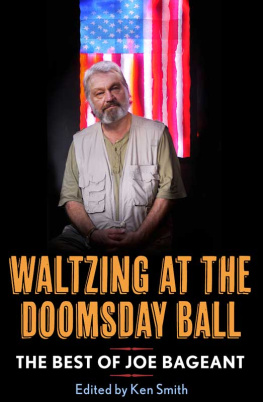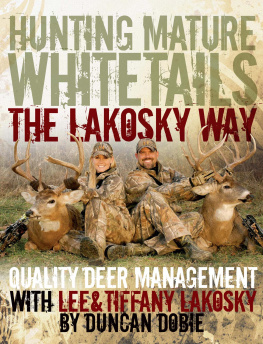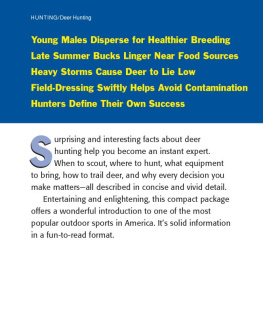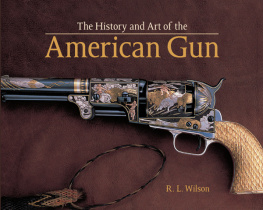Deer Hunting
with Jesus
DISPATCHES FROMAMERICA'S
CLASS WAR
JOE BAGEANT
2007
For Barbara and Ken
A NOTE FROM THEAUTHOR
While the events in this book are truefrom "whuppingup" on boxing chimpanzees at carnivals to demon wrestling matches in theHoly Roller trailer courtsthe names and identifying characteristics of many ofthe people described have been changed in order to protect their privacy.
INTRODUCTION
1. American Serfs
Inside the White Ghetto of the Working Poor
2. Republicans byDefault
Redneck Pride and Fear in an Age of Outsourcing
3. The Deep-Fried,Double-Wide Lifestyle
Whatever it Takes, The Mortgage Racket Will Put You
Under Your Own Roof
4. Valley of the Gun
Black Powder and Buckskin in Heartland America
5. The Covert Kingdom
They Plead Upon the Blood of Jesus for a Theocratic State
6. The Ballad ofLynddie England
One Foot in Ulster, The Other in Iraq
7. An AuthorizedPlace to Die
The American Health Care System on Life Support
8. American Hologram
The Apocalypse Will Be Televised
ACKNOWLEDGMENTS
Introduction
On the morning of November 2, 2004, millions of Democratsarose to a new order. Smoke from neoconservative campfires hung over all pointssouthward and westward. The hairy fundamentalist Christian hordes, the redneckblue-collar legions, and other cultural Visigoths stirred behind distantbattlements. In university towns across the country, in San Francisco, Seattle,and Boulder, in that bluest of blue strongholds, New York City, and in everyself-contained, oblivious corner of liberal America where a man or woman canbuy a copy of The Nation withoutspecial-ordering it, Democrats sank into the deepest kind of Prozac-proofdepression. What, they wondered, happened out there in the heartland, theiconographic one they'd seen on television and in magazines, the one brightwith church spires, grange halls, stock-car races, and community heritagefestivals. And why had the working class so plainly voted against their owninterests?
Two years later, Democrats regained, for the time being atleast, a majority, and liberals have had time to contemplate what they see asthe deeply uncultured mob that trounced them in 2004. They have watched paneldiscussions on PBS. They have argued about where political strategy went wrong.But the one thing the thinking left and urban liberals have not done is treadthe soil of the Gothsubject themselves to the unwashed working-class America,to that churchgoing, hunting and fishing, Bud Light-drinking, provincialAmerica. To the people who cannot, and do not care to, locate Iraq or France ona mapassuming they even own an atlas. Few educated liberals will ever findthemselves sucking down canned beer at the local dirt track or listening to thepreacher explain the infallibility of the Bible on every known topic frombiology to the designated-hitter rule or attending awards night at a Christianschool or getting drunk to Teddy and the Starlight Ramblers playing C&W atthe Eagles Club.
Well, ho ho ho! Welcome to my world!
Here in my hometown, Winchester, Virginia, it is impossibleto avoid the America that carried George W. Bush to victory in 2004 (and wouldagain elect someone else just as unsavory even if they turn on Bush like feraldogs in these last days of his attempted imperial reign, even if he is hauledout of the Oval Office in custody). Winchester is one of those southern placeswhere the question of whether Stonewall Jackson had jock itch at the Battle ofChancellorsville still rages right alongside evolution, gun control, abortion,and whether Dale Earnhardt Jr. is half the driver his daddy was. The area issolidly fundamentalist Christian and neoconservative, steeped in the gloomyultra-Protestant assumption that man is an evil, worthless thing from birth andgoes downhill from there. If nothing else, though, Winchester is a marvelousplace from which to observe this nationwhere the oldest and the newest Americaand all the vestigial mutant stages in between exist in spittle-flecked livingcolor.
Winchester is foremost a working-class town, despite theyuppie monster-bellums springing up on seven-acre plots all around it and theprettying-up of the old town core as a historic district. You can makelightbulbs at the GE plant, you can make styrene mop buckets at Rubbermaid, oryou can "bust cartons," "stack product," and cashier atWal-Mart and Home Depot. But whatever you do, you're likely to do it as a"team assembler" at a plant or as a cashier standing on a rubber matwith a scanner in your paw. And you're gonna do it for a working-man's wageforabout $16,000 a year if you're a cashier, $26,000 if you're one of those teamassemblers. Yet this place from which and about which I am writing could be anyof thousands of communities across the United States. It is an unacknowledgedparallel world to that of educated urban liberalsthe world that blindsidedthem in November 2004 and the one they will need to come to understand if theyare ever to be politically relevant again.
By what authority am I entitled to rant in these pages? Nonereally, other than being the native son of a working America gone downhill.That realization came in 1999, when, after a thirty-year absence, I decided tomove back to my hometown and saw the creeping (and creepy) way the lives of myworking-class family members, my neighborhood, and my community had beendevalued and degraded by the forces against which left-leaning people havealways railedthe same forces my family and town so solidly backed in thevoting booths.
My part of Winchester, the North End, contains the mosthard-core of the town's working-class neighborhoods, where you are more likelyto find the $20,000-a-year laborer and the $14,000-a-year fast-food worker. Igrew up here, my dad worked at a gas station here, and my mom worked at a sincedemolished textile mill whose rattling looms were the round-the-clock backdropof our lives. I smoked my first cigarette here and married a poor white girlfrom down the street. My forebears are buried here, and all my ghosts areherethe ghosts of 250 years of ancestors, the ghosts of old love affairs, andthe ghost of my youth. I know everyone's last name, whose daddy was who, andwho boinked whom when we were in high school. So when I moved back after thirtyyears out West, it was as if my heart was back where it belonged. Which lastedabout three months.
It didn't take too many visits to the old neighborhoodtavern or to the shabby church I attended as a child to discover that here inthis neighborhood in the richest nation on earth folks are having a hard go ofit. And it's getting harder. Two in five residents of the North End do not havea high school diploma. Here, nearly everyone over fifty has serious healthproblems, credit ratings rarely top 500, and alcohol, Jesus, and overeating arethe three preferred avenues of escape. These days the neighborhood looks as ifit was painted by Edward Hopper, then bleakly populated with gangstas, old menwith forty-ounce malt liquor bottles, hardworking single moms, and kids oncheap, busted plastic tricycles. The city government tries to cover the povertywith ordinances that make the local slumlords paint the exteriors of therentals, but paint can cover only so much.
Wedged between the old railroad station and the Confederatecemetery, the North End neighborhood was once the redneck buffer for whiteWinchester. Everyone in town knew which streets represented the color line.Those same streets are becoming black and Latino now, and you can see thefamilies who live there going through the same struggles for modestrespectability in these rental properties as the working-poor whites who ownedthem in the fifties and early sixties, when it was possible to buy a house on alow-wage working couple's income. They place foil-covered flowerpots onporches, and they crisply cut the earth along sidewalks with lawn-edging tools,as if the red clay pounded by the feet of neighborhood kids were ever going toproduce enough grass to threaten the walkways. They do the very things whiteworking people once did to proclaim: "We might be poor but we ain'tcoloreds."











